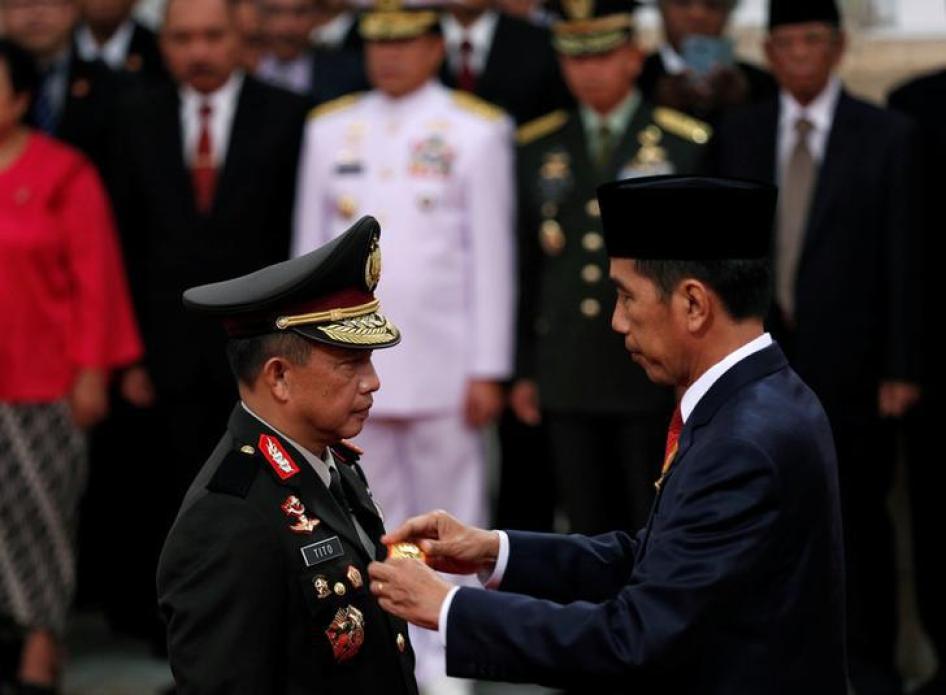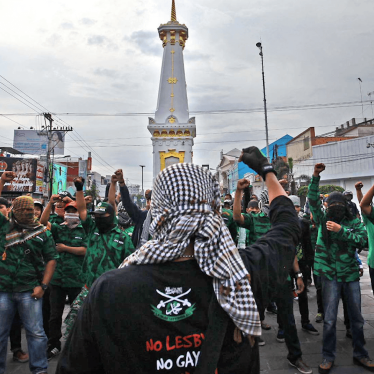(Jakarta, September 6, 2017) – The Indonesian government should urgently investigate the September 2, 2017 police raid on the homes of 12 “suspected lesbians,” Human Rights Watch said today. The raid and ensuing forced evictions violate the rights to privacy, non-discrimination and basic due process.
The police raided a residential compound in West Java province’s Tugu Jaya village in response to complaints from local Islamic youth groups and religious leaders that the women’s cohabitation was “against the teachings of Islam.” Police demanded that the women immediately relocate from the area without providing any legal justification for the order, according to authorities, Human Rights Watch interviewed.
“What’s most offensive about this incident is that police and government officials steamrolled privacy rights and rule of law to appease the bigotry of a few neighbors,” said Andreas Harsono, senior Indonesia researcher at Human Rights Watch. “Evicting these women based on prejudiced assumptions of their sexual identity threatens the privacy of all Indonesians and has no place in a country whose motto is ‘unity in diversity.’”
Human Rights Watch research found that the police raid, led by the head of Tugu Jaya village, Sugandi Sigit, and the police commissioner, Saifuddin Ibrahim, resulted in the 12 women immediately vacating their homes and leaving the area. Mohammad Karim, the head of the neighborhood where the women live in Tugu Jaya, sought to justify the raid by saying that the women were “unsettling the public.”
A village official who asked not to be named told Human Rights Watch: “It’s not acceptable to have female couples living together. Some have short hair, acting as the males. Some have long hair, acting as the females. It’s against Sharia [Islamic law]. It’s obscene.” The women’s whereabouts are currently unknown and Human Rights Watch has been unable to contact them.
During the raids on the women’s homes, police and government officials recorded the details of the women’s national identity cards before instructing them to leave the area in three days. Sumantri, the head of the Cigombong district public order office that took part in the raids, said that police and government officials told the women that “their presence had created public disturbance in the area. We politely asked them to leave.”
This forced eviction, in violation of international legal protections, fits into a disturbing pattern of discrimination and unlawful use of force by police against lesbian, gay, bisexual, and transgender (LGBT) people in Indonesia, Human Rights Watch said. In her 2013 report on Indonesia, the United Nations special rapporteur on the right to housing noted a pattern of forced evictions of LGBT people in the country.
There have been at least four raids on LGBT people in private settings in 2017 alone. On March 28, unidentified vigilantes forcibly entered an apartment in Aceh province and took two men in their twenties to the police for allegedly having same-sex relations.
Two months later, authorities publicly flogged the men. On April 30, police raided a private gathering of gay and bisexual men in the city of Surabaya, arrested and detained 14 of them, and subjected them to HIV tests without their consent. On May 21, police raided the Atlantis Spa in Jakarta, arrested 141 people, and charged 10 for holding an alleged sex party. And on June 8, police apprehended five “suspected lesbians” and ordered their parents to supervise them – and shared a video of the raid and the names of the five women with reporters.
On June 1, Human Rights Watch wrote to National Police Chief Gen. Tito Karnavian calling on him to order an immediate halt to such discriminatory targeting of LGBT people and investigate the legality of police actions during the raids. Karnavian, who oversees all regional and municipal police forces in the country and reports directly to President Joko “Jokowi” Widodo, has not responded to Human Rights Watch’s letter.
Anti-LGBT incidents across Indonesia have significantly increased since a January 2016 spike in noxious and hateful rhetoric from public officials and politicians – including police raids on suspected gatherings of LGBT people, the closure of public transgender events, and attacks on activists. In October 2016, President Jokowi broke his long silence on escalating anti-LGBT rhetoric by defending the rights of the country’s LGBT community. He declared that “the police must act” against actions by bigoted groups or individuals to harm LGBT people or deny them their rights, and that “there should be no discrimination against anyone.”
“Police raids on private gatherings of LGBT people foster dangerous anti-gay hysteria at a time when the government should instead be stepping up to protect this marginalized minority,” Harsono said. “It has been nearly a year since President Jokowi pledged his support to the LGBT community, but his failure to take action has allowed raids like this to continue unabated.”









